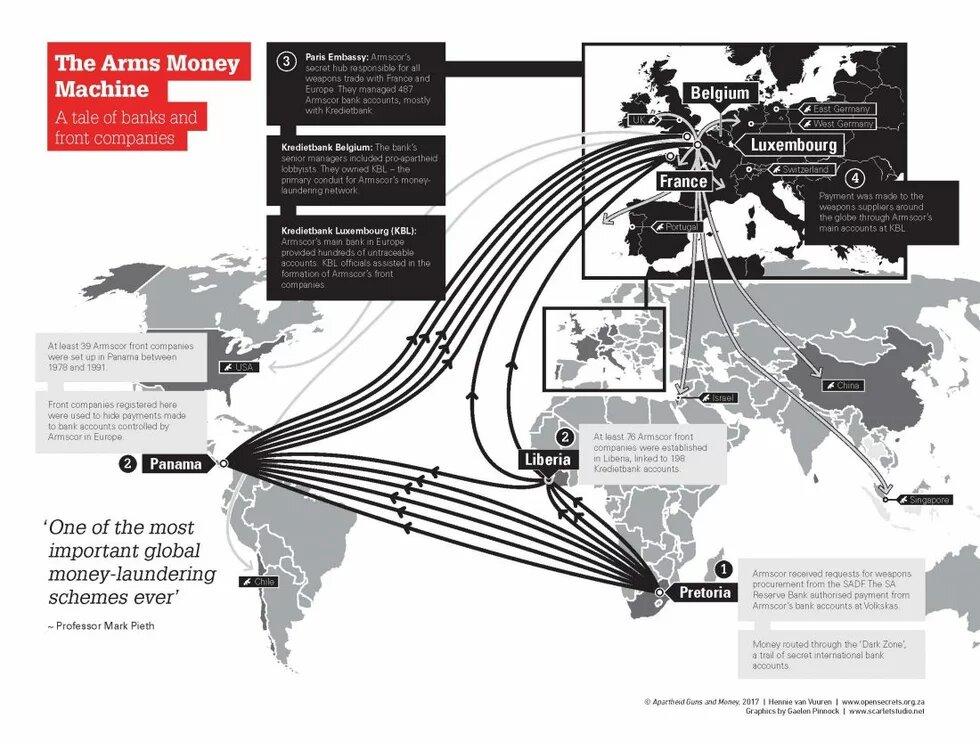
A heavy blow has been dealt to two European banks at the centre of the apartheid-era international arms money machine. The implicated banks are KBC Group (previously Kredietbank) and Kredietbank Luxembourg (KBL). Evidence in the possession of Open Secrets shows that the banks were responsible for channelling billions of dollars through a global money-laundering scheme used to secretly buy weapons. This, despite mandatory UN arms sanctions against apartheid South Africa at the time. The impact of this action was to prolong the apartheid regime and effectively support a crime against humanity.
UN expert weighs in
On 28 May 2018, UN Independent Expert on the effects of foreign debt, Mr. Juan Pablo Bohoslavsky, submitted an amicus application to the Belgium and Luxembourg OECD National Contact Points (NCPs) in support of the complaint lodged by Open Secrets and CALS in April this year. This complaint uses the OECD Guidelines, one of the few international accountability mechanisms available, to attempt to hold the banks accountable for decades of impunity.
Bohoslavsky’s independent submission provides valuable evidence of the extensive role of financial institutions in supporting regimes that commit human rights violations. Importantly, he provides support for our argument that economic assistance by private actors to such regimes is potentially criminal conduct under international law. Bohoslavsky argues that, “This case is about learning the truth relating to financial contributions to a criminal regime that violated jus cogens [the norms of international law] and how these actors have helped in the consolidation of it.”
This amicus intervention strengthens our complaint by underscoring the link between economic crimes and human rights. It highlights the importance of holding private sector actors accountable for their complicity in grave injustices, past and present.
Belgian conflicts of interest exposed
On 06 June 2018, Open Secrets and CALS sent a letter to the Belgian and Luxembourg authorities alerting them to serious conflicts of interest that we have identified within the body that will consider our complaint in Belgium. We have requested the recusal of powerful conflicted parties whose participation we fear could derail the legitimacy of this process. The Belgian NCP is a tripartite structure that includes government, trade unions, and employers’ associations. Crucially, we have identified the Federation of Enterprises in Belgium (FEB) playing a key role as one of the employers’ federations. The president, CEO, and director of KBC Group, the bank against whom the complaint was brought, all sit on the FEB’s strategy committee, which plays a key role in the FEB’s decision making. Other senior KBC executives hold similarly influential positions within the FEB. In addition, Comeos, a subsidiary association of the FEB that is independently represented on the NCP, has a stated structural partnership with KBC Group.
These individuals and bodies have a clear and direct interest in downplaying the seriousness or dismissing the OECD complaint. It is in the interests of fairness and transparency that they be immediately recused from any involvement in this matter. Challenging KBC’s influence over the consideration of this complaint is a critical step toward genuine accountability and a just outcome. We have sent a copy of this letter to officials from the Belgium and Luxembourg NCPs who are meeting with the OECD in Paris today, and expect them to treat this matter with the seriousness it deserves.
Read the OECD complaint here, and Mr. Juan Pablo Bohoslavsky’s amicus application here.
To find out more about the complaint and the next steps in the process, visit www.opensecrets.org.za.